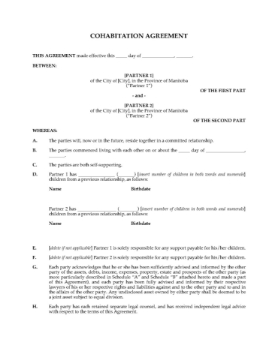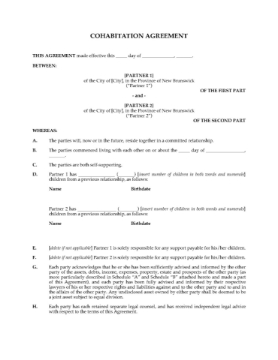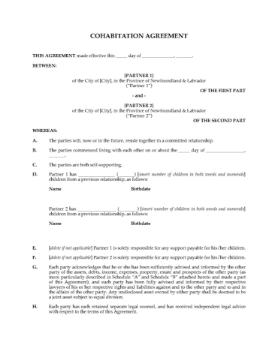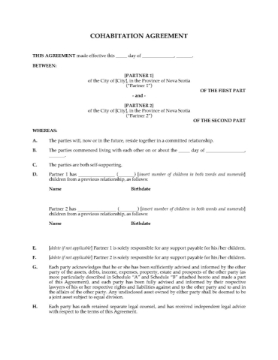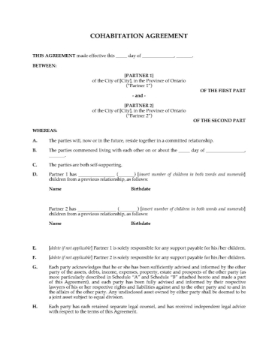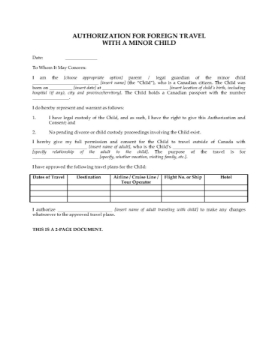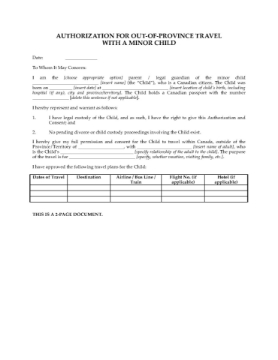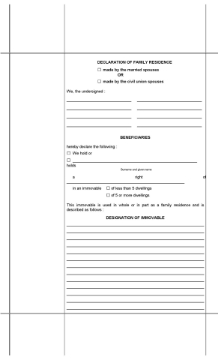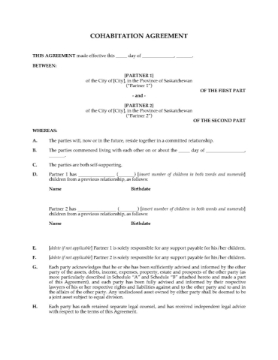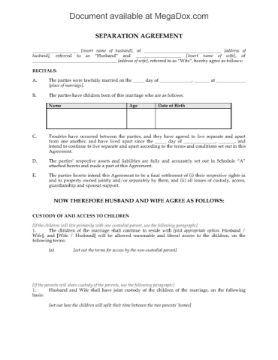CANADA
Download contract forms for domestic and family matters under Canadian federal and provincial laws.
Our template forms cover such domestic arrangements as:
- cohabitation,
- matrimonial property,
- common law relationships,
- parenting,
- separation,
- custody of minor children.
The forms are available in MS Word format and are fully customizable. They include instructions, especially in relation to obtaining legal advice prior to signing.
Canadian Laws Governing Common Law Relationships
A recent ruling by the Supreme Court of Canada that common law spouses in Quebec are not entitled to the same rights as married couples under the Civil Code may have legal implications in other parts of the country.
That's why it's more important than ever for common law couples to have a written cohabitation agreement in place that spells out their intentions regarding jointly and separately owned property, child support, custody issues, and spousal maintenance.
Each province and territory of Canada has its own legislation, and the legal rights of partners may differ from place to place. The Quebec ruling may encourage other provinces to review their own laws, and this could result in further Supreme Court challenges.
Manitoba Cohabitation Agreement
Manitoba law treats common law relationships of 3 years or longer the same as legal marriage, and you could end up losing all or part of your separately owned assets if you separate. You should consider signing a Manitoba Cohabitation Agreement.
- The purpose of a Cohabitation Agreement is to determine who owns what, how jointly owned property will be distributed if the relationship ends, and what each partner's responsibilities are to raise and support their children.
- Whatever assets a partner brought into the relationship will continue to belong to that partner. The other person has no ownership interest in them.
- Any assets that were purchased jointly during the relationship would be divided equally between the partners if they decide to break up.
- Both parties are responsible for raising and caring for the children they have together.
- You must both get independent legal advice from a lawyer before you sign. The document includes a Certificate of Independent Legal Advice for the lawyer to sign after seeing you.
- Available in MS Word format.
- Intended to be used only in the Province of Manitoba, Canada.
New Brunswick Cohabitation Agreement
The New Brunswick Marital Property Act does not apply to common law couples unless they have signed a domestic contract. That's why you and your partner need to sign a Cohabitation Agreement.
- This Agreement sets out each partner's legal rights and obligations with respect to child support, estate rights and jointly and separately owned property.
- Each partner continues to own the assets he/she brought into the relationship, and any assets acquired during the relationship are jointly owned by both partners.
- Each partner is solely responsible for his/her own debts and financial obligations.
- The partners agree to jointly raise and support the children they have together.
- Each partner waives any right to any inheritance left to the other partner by a will or under the laws of succession.
- This document comes with a Certificate of Independent Legal Advice for each partner. You must see a lawyer and get independent legal advice before you sign the Agreement.
- Intended for use only in the Province of New Brunswick, Canada.
Newfoundland Cohabitation Agreement
Common law couples do not have the same rights as married couples under Newfoundland law. To make sure your rights are protected, you need to sign a Cohabitation Agreement.
- A cohabitation agreement is permitted under the Family Law Act. It gives you and your partner the opportunity to set out in writing what your rights and obligations to each other are.
- You can decide what happens to assets that the two of you purchase jointly, if the relationship comes to an end.
- The agreement sets out what each partner's responsibilities will be with respect to raising and caring for the children, and paying the household debts.
- Since common law spouses do not have matrimonial property rights under provincial law, this agreement covers that as well.
- Both partners must get independent legal advice from a lawyer before signing the agreement. The form includes a Certificate of Independent Legal Advice that the lawyer must complete.
- Available in MS Word format.
- For use only in the Province of Newfoundland and Labrador.
Nova Scotia Cohabitation Agreement
In Nova Scotia common law couples can register as domestic partners, which gives you some of the same rights as a married couple. For best protection, you should have a Cohabitation Agreement in place.
- The Agreement allows you and your partner to specify which assets each of you owned prior to the relationship, and which are jointly owned by both of you.
- You can also set out how your joint assets will be distributed if you decide to end the relationship.
- You can also agree upon how household expenses will be split, and who is responsible for other debts. For instance, if your partner owes money on a student loan incurred before you met, he/she may be solely responsible for paying it off.
- If the two of you decide to get married, the Cohabitation Agreement becomes a prenuptial (pre-marriage) agreement.
- Before signing this Agreement, you and your partner must each get independent legal advice from a lawyer. The form includes a Certificate of Independent Legal Advice for each party.
- Available in MS Word format, fully customizable.
- For use only in the Province of Nova Scotia, Canada.
Ontario Cohabitation Agreement
Cohabiting couples in Ontario can establish their rights and obligations and the ownership of their separate and joint property in a Cohabitation Agreement.
- The Agreement allows you and your partner to specify which assets each of you owned prior to the relationship, and which are jointly owned by both of you.
- You can also set out how your joint assets will be distributed if you decide to end the relationship.
- You can also agree upon how household expenses will be split, and who is responsible for other debts. For instance, if your partner owes money on a student loan incurred before you met, he/she may be solely responsible for paying it off.
- If the two of you decide to get married, the Cohabitation Agreement becomes a prenuptial (pre-marriage) agreement.
- You will both need to get independent legal advice from a lawyer before you sign the Agreement. A Certificate of Independent Legal Advice is included for each of you, which the lawyer will sign after seeing you.
- Ontario law treats married and cohabiting couples differently with respect to property rights. Make sure yours are protected.
- Available in MS Word format, fully customizable.
Parental Authorization for Foreign Travel with Minor | Canada
If your child is going to travel outside of Canada with another adult, you will need to give your consent with a Parental Authorization Form for Foreign Travel with a Minor Child.
- This form can only be used by Canadian residents.
- The parent or guardian authorizing the trip must have legal custody of the child.
- You must attest that there no divorce or custody proceedings in process that would affect your legal custody.
- This is a downloadable and customizable legal form which can be re-used as often as you require.
Parental Consent for Travel with Minor Child | Canada
Give written consent for your child to travel within Canada in the company of another adult with this Parental Consent and Authorization form.
- This form is only valid for travel within the provinces and territories of Canada.
- The parent or guardian consenting to the travel represents that he/she has legal custody of the child.
- The parent/guardian must also attest that no divorce or child custody proceedings are pending with respect to the child.
- The parent / guardian states that s/he is giving consent of his/her own free will.
- This Parental Authorization for Travel with Minor Child is a legal document that proves the adult traveling with the child has your permission. Failure to produce it upon request could result in delays, cancellations, and even arrest.
- Available in MS Word format. Use it as often as necessary.
Quebec Declaration of Family Residence (English version)
Protect your occupation of your home if you separate from your partner by registering a Declaration of Family Residence.
- If you are married or in a civil union and you have registered a Declaration of Family Residence, your occupation of your home is protected if you separate. Your former spouse will not be able to sell, lease or mortgage your home.
- The same rule applies if you rent your home and have added a statement to your lease declaring that it is your family residence. In this case, your former spouse will not be able to transfer the lease without your written consent.
- The family residence forms part of the family patrimony of a couple who are married or in a civil union, regardless of which spouse actually owns it.
- The form is a free Microsoft Word download. English language version.
- Intended to be used only in the Province of Quebec, Canada.
Saskatchewan Cohabitation Agreement
After 2 years of living together, common law couples in Saskatchewan have the same rights and obligations under the law as married couples. You can change that by signing a Cohabitation Agreement.
- A cohabitation agreement gives you a chance to establish who owns what property. For instance, each partner would continue to own the assets that they owned when they entered the relationship.
- Any property jointly acquired by the parties would be divided equally between them if the relationship ends, or would be sold and the sale proceeds split evenly.
- The Agreement contains a provision that each partner is responsible for his or her own debts and financial obligations.
- The partners will be jointly responsible for raising, supporting and caring for any children they have together.
- Before signing the Agreement, you and your partner must get independent legal advice from a lawyer. A Certificate of Independent Legal Advice for each party is included as part of the document, and must be signed by the lawyer.
- This legal form is available as a downloadable MS Word template.
- Intended for use only in the Province of Saskatchewan, Canada.
Separation Agreement | Canada
Have you and your spouse decided to separate? Put the terms of the separation in writing with this Separation Agreement for Canada.
- The Agreement provides for custody of and access to the children of the marriage (if any), and the amount of spousal support and child maintenance to be paid by one spouse to the other (if any).
- Joint debts will be paid by both parties, and debts owed by one of the individuals will be paid solely by the person owing the debt.
- The parties will agree on how property jointly owned by both spouses will be divided. Property owned by only one person will belong to that person.
- There is a section dealing with the disposition of the matrimonial home, which must be agreed on by both parties.
- Each spouse must list his or her assets and liabilities.
- The form includes an Affidavit of Execution form (to be sworn by a witness), a Certificate of Independent Legal Advice or an Acknowledgement and Waiver of Independent Legal Advice (whichever is appropriate).
- You will need to see a lawyer for independent legal advice before signing this form.
- Available in MS Word format.
- Drafted in consideration of Canadian laws and intended to be used only in Canada.

